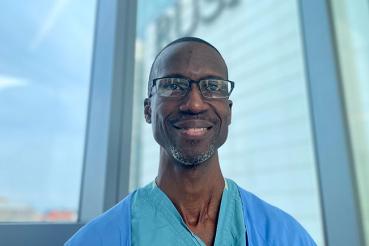The esophagus is a tube that runs from your throat to your stomach, carrying food that fuels the rest of your body. Esophageal cancer is caused by cell changes in the esophagus. These changes can happen at the top of your esophagus (close to your mouth), at the end of your esophagus (close to your stomach) or anywhere in between.
There are two common types of esophageal cancer:
- Esophageal adenocarcinoma: This is the most common kind of esophageal cancer. It’s often found in the lower third of the esophagus, where stomach acid can cause damage over time that leads to cancer.
- Squamous cell carcinoma: This type is than 30% of esophageal cancers. It’s most common in the neck area and upper two-thirds of the esophagus.
Risk Factors for Esophageal Cancer
Men and people older than 55 are more likely to develop this kind of cancer.
Other risk factors include:
- Tobacco and alcohol: Cigarettes, cigars, pipes, chewing tobacco and any other kind of tobacco increase your risk of esophageal cancer. Drinking alcohol also increases your risk. Smoking (or other tobacco use) combined with drinking raises your risk factor much more than either individually.
- GERD and Barrett’s esophagus: When stomach acid travels back up the esophagus, it can damage the sensitive tissues there. If you have GERD symptoms for a long time, these changes can become Barrett’s esophagus. Both conditions increase your risk for esophageal cancer, specifically esophageal adenocarcinoma.
- Diet: Eating processed meats has been linked to esophageal cancer. Also, a diet high in fruits and vegetables has been shown to reduce your likelihood of many cancers, including esophageal cancer. Frequently drinking hot liquids (such as hot water or very hot coffee or tea) may also increase your risk of this kind of cancer.
- Achalasia: This is when the muscle at the low end of your esophagus (near the stomach) does not relax correctly. In addition to difficulty swallowing and other symptoms, achalasia increases your risk for esophageal cancer, specifically esophageal adenocarcinoma.
Esophageal Cancer Symptoms
Esophageal cancer often shows no symptoms until it has spread to other parts of the body. Talk to your doctor about your risk factors and screenings that can catch the cancer before it spreads.
Esophageal cancer symptoms include:
- Unexplained weight loss
- Difficulty swallowing
- Hoarseness
- Heartburn
- Indigestion

Esophageal Cancer Treatment at Rush
Treatment for esophageal cancer depends on what kind of cancer you have. It also depends on what stage it is (how much the cancer has grown).
Esophageal cancer staging starts with understanding the size of the tumor. Some tumors are only in the inner wall of the esophagus, while others have grown outside it. Your doctors will also check if cancer has spread to other organs or to lymph nodes, either close to your esophagus or further away.
What to Expect During Esophageal Cancer Treatment
Esophageal cancer staging is important for understanding your treatment options, which may include:
- Surgery: Surgery for esophageal cancer is a good option if your cancer has not spread outside the esophagus or to other body parts near the esophagus. Your doctors will also consider if you’re healthy enough for surgery for esophageal cancer. Surgery can remove part or most of the esophagus (esophagectomy), using your stomach or intestine to create a new tube that will transport food from your mouth to your stomach. We can usually use a minimally invasive technique that will reduce your recovery time.
- Radiation: X-rays can be used to destroy cancer cells. Radiation is usually combined with chemotherapy and/or surgery. You may have radiation therapy before surgery to make the tumor easier to remove, after surgery to kill cancer cells left behind or as your main therapy (if surgery isn’t an option).
- Chemotherapy: This treatment uses chemicals (drugs) to kill cancer cells. You will receive these drugs via intravenous infusion or as an injection. Chemotherapy, or chemo, is often combined with surgery and/or radiation to give you the best option at a good outcome. You may get chemo after surgery to kill remaining cancer cells or before surgery to reduce the size of your tumor.
- Endoscopic procedures: Depending on your needs, you may see an endoscopist, a specially trained doctor who uses a tube inserted into the esophagus. Endoscopy can treat early-stage cancers. Endoscopic treatment options may include removing the cancer, applying a cancer-killing drug or directing a laser at a tumor (to reduce the size).
If you’ve been diagnosed with esophageal cancer, a second opinion can help you understand all your options. At Rush, we want you to feel confident about your treatment plan and offer second opinion services.
What to Expect After Esophageal Cancer Treatment
In addition to treating esophageal cancer, our team focuses on treatments that can improve your quality of life.
Endoscopy is an important tool for patients with esophageal cancer. We can use endoscopy to make it easier to swallow. Using a scope inserted through your mouth while you’re sedated, we widen the esophagus. We can use a balloon to stretch the esophagus out or place a mesh stent to keep it open more permanently.
Many people with esophageal cancer have trouble gaining or maintaining weight. If you have surgery to treat esophageal cancer, you may notice a difference in how your body digests food. We work closely with a dietitian who understands your needs and can help relieve your problems following esophageal cancer treatment. This may include a feeding tube placement, eating smaller meals more often or an endoscopic treatment to widen your esophagus.
Rush Excellence in Esophageal Cancer Treatment
- Nationally ranked experts focused on you: Rush University Medical Center in Chicago is ranked among the best in the nation for cancer, gastroenterology and GI surgery and ENT care by U.S. News & World Report. In addition, our thoracic surgery team has been repeatedly recognized for their excellent outcomes by the Society of Thoracic Surgeons. Specialists in all these areas will work with you and each other to create a personalized treatment plan for you.
- Many experts, one team, one appointment: Your cancer care team may include medical oncologists, gastroenterologists, medical, radiation and surgical oncologists, thoracic surgeons, head and neck surgeons, interventional radiologists, genetic counselors, dietitians, social work, supportive oncology, nursing coordinators and others. In many cases, they will meet with you in a single visit to discuss your diagnosis and treatment options. At the end of this meeting, you will have a comprehensive treatment plan tailored to your specific diagnosis and needs. Your team will then help guide you through your entire continuum of care, including coordinating tests, treatments and appointments and addressing any concerns you may have along the way.
- More accurate, more rapid results: At Rush, we know that time to esophageal cancer treatment matters. Our esophageal cancer specialists use the latest technology and approaches, so you can get test results quickly and receive proper treatment right away.
- Minimally invasive options: Whenever possible, our surgeons perform procedures using small incisions, such as video-assisted thoracoscopic surgery (VATS) to diagnose and treat esophageal cancer. With minimally invasive approaches, you will have less pain, fewer complications and a shorter recovery time.
Esophageal Cancer FAQs
As with many cancers, esophageal cancer is very treatable when detected early. If you’re experiencing esophageal cancer symptoms, talk to your doctor about your risk factors.
The American Cancer Society publishes five-year relative survival rates for many kinds of cancer. The relative survival rate compares people with cancer to the wider population. For example, someone with a type of cancer with a 95% five-year relative survival rate is 95% as likely as someone who doesn’t have that cancer to live for five years after diagnosis.
The five-year relative survival rate for esophageal cancer that hasn’t spread outside the esophagus is 49%. The five-year relative survival rate for esophageal cancer that has spread to nearby lymph nodes is 28%. The five-year relative survival rate for esophageal cancer that has spread to distant lymph nodes or organs is 6%.





